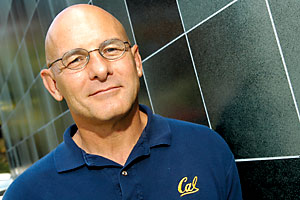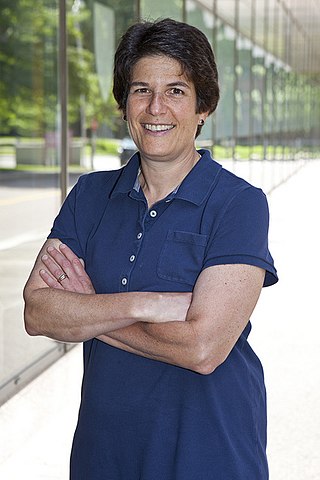Related Research Articles

Andrew Stuart Tanenbaum, sometimes referred to by the handle ast, is an American-Dutch computer scientist and professor emeritus of computer science at the Vrije Universiteit Amsterdam in the Netherlands.

Brian Wilson Kernighan is a Canadian computer scientist.

Dennis MacAlistair Ritchie was an American computer scientist. He is most well known for creating the C programming language and, with long-time colleague Ken Thompson, the Unix operating system and B programming language. Ritchie and Thompson were awarded the Turing Award from the ACM in 1983, the Hamming Medal from the IEEE in 1990 and the National Medal of Technology from President Bill Clinton in 1999. Ritchie was the head of Lucent Technologies System Software Research Department when he retired in 2007. He was the "R" in K&R C, and commonly known by his username dmr.

A Unix shell is a command-line interpreter or shell that provides a command line user interface for Unix-like operating systems. The shell is both an interactive command language and a scripting language, and is used by the operating system to control the execution of the system using shell scripts.

Malcolm Douglas McIlroy is a mathematician, engineer, and programmer. As of 2019 he is an Adjunct Professor of Computer Science at Dartmouth College. McIlroy is best known for having originally proposed Unix pipelines and developed several Unix tools, such as spell, diff, sort, join, graph, speak, and tr. He was also one of the pioneering researchers of macro processors and programming language extensibility. He participated in the design of multiple influential programming languages, particularly PL/I, SNOBOL, ALTRAN, TMG and C++.

Stephen Richard "Steve" Bourne is an English computer scientist based in the United States for most of his career. He is well known as the author of the Bourne shell (sh), which is the foundation for the standard command-line interfaces to Unix.

USENIX is an American 501(c)(3) nonprofit membership organization based in Berkeley, California and founded in 1975 that supports advanced computing systems and operating system (OS) research. Its stated mission is to foster technical excellence and innovation, support and disseminate research with a practical bias, provide a neutral forum for discussion of technical issues, and encourage computing outreach into the community at large.

John Leroy Hennessy is an American computer scientist, academician and businessman who serves as Chairman of Alphabet Inc. Hennessy is one of the founders of MIPS Computer Systems Inc. as well as Atheros and served as the tenth President of Stanford University. Hennessy announced that he would step down in the summer of 2016. He was succeeded as president by Marc Tessier-Lavigne. Marc Andreessen called him "the godfather of Silicon Valley."
ASSIST is an IBM System/370-compatible assembler and interpreter developed in the early 1970s at Penn State University by Graham Campbell and John Mashey. plus student assistants.

John Lions was an Australian computer scientist. He is best known as the author of Lions' Commentary on UNIX 6th Edition, with Source Code, commonly known as the Lions Book.

RISC iX is a discontinued Unix operating system designed to run on a series of workstations based on the Acorn Archimedes microcomputer. Heavily based on 4.3BSD, it was initially completed in 1988, a year after Arthur but before RISC OS. It was introduced in the ARM2-based R140 workstation in 1989, followed up by the ARM3-based R200-series workstations in 1990.

David Andrew Patterson is an American computer pioneer and academic who has held the position of professor of computer science at the University of California, Berkeley since 1976. He announced retirement in 2016 after serving nearly forty years, becoming a distinguished software engineer at Google. He currently is vice chair of the board of directors of the RISC-V Foundation, and the Pardee Professor of Computer Science, Emeritus at UC Berkeley.
The Thompson shell was the first Unix shell, introduced in the first version of Unix in 1971, and was written by Ken Thompson. It was a simple command interpreter, not designed for scripting, but nonetheless introduced several innovative features to the command-line interface and led to the development of the later Unix shells.
The Programmer's Workbench (PWB/UNIX) is an early, now discontinued, version of the Unix operating system that had been created in the Bell Labs Computer Science Research Group of AT&T. Its stated goal was to provide a time-sharing working environment for large groups of programmers, writing software for larger batch processing computers.
The PWB shell was a Unix shell.

Margo Ilene Seltzer is a professor and researcher in computer systems. She is currently the Canada 150 Research Chair in Computer Systems and the Cheriton Family Chair in Computer Science at the University of British Columbia. Previously, Seltzer was the Herchel Smith Professor of Computer Science at Harvard University's John A. Paulson School of Engineering and Applied Sciences and director at the Center for Research on Computation and Society.

Ozalp Babaoğlu, is a Turkish computer scientist. He is currently professor of computer science at the University of Bologna, Italy. He received a Ph.D. in 1981 from the University of California at Berkeley. He is the recipient of 1982 Sakrison Memorial Award, 1989 UNIX International Recognition Award and 1993 USENIX Association Lifetime Achievement Award for his contributions to the UNIX system community and to Open Industry Standards. Before moving to Bologna in 1988, Babaoğlu was an associate professor in the Department of Computer Science at Cornell University. He has participated in several European research projects in distributed computing and complex systems. Babaoğlu is an ACM Fellow, a resident fellow of the Institute of Advanced Studies at the University of Bologna and has served on the editorial boards for ACM Transactions on Computer Systems, ACM Transactions on Autonomous and Adaptive Systems and Springer-Verlag Distributed Computing.

David Gries is an American computer scientist at Cornell University, United States mainly known for his books The Science of Programming (1981) and A Logical Approach to Discrete Math.

The Software Tools Users Group (STUG) was a technical organization started in 1976, in parallel with Usenix. The STUG goal was to develop a powerful and portable Unix-like system that could be implemented on top of virtually any operating system, providing the capabilities and features of Unix in a non-proprietary system. With its focus on building clean, portable, reusable code shared amongst multiple applications and runnable on any operating system, the Software Tools movement reestablished the tradition of open source and the concepts of empowering users to define, develop, control, and freely distribute their computing environment.
Rudd Canaday is an American computer systems engineer and a previous member of the technical staff at the Bell Telephone Laboratories in Murray Hill, New Jersey, credited to co-develop the initial design of the Unix file system. In 2015 he joined a Palo Alto based tech startup, Entefy, as a Senior Architect & Engineer.
References
- ↑ Mashey, John R. (1974). Semantic error detection in programming languages (PhD). Dissertation Abstracts International B. Vol. 35. Pennsylvania State University. p. 2700. ISBN 9798641079790.
- ↑ Mashey, J.R. (February 1973). "ASSIST: Three year's experience with a student-oriented assembler". ACM SIGCSE Bulletin - Proceedings of the 3rd SIGCSE Symposium on Computer Science Education. 5 (1): 157–165. doi:10.1145/800010.808101. S2CID 45453765.
- ↑ Dolotta, T.A.; Haight, R.C.; Mashey, J.R. (July–August 1978). "The Programmer's Workbench" (PDF). Bell System Technical Journal. 57 (6 Part 2): 2177–2200. doi:10.1002/j.1538-7305.1978.tb02148.x. S2CID 21869088.
- 1 2 3 4 5 "John Mashey". Trustee bio. Computer History Museum. Retrieved September 28, 2016.
- ↑ John Mashey (August 30, 2000). "NUMAflex Modular Design Approach: A Revolution in Evolution" . Retrieved September 28, 2016.
- ↑ Fan, Wei; Bifet, Albert (December 2012). "Mining big data: current status, and forecast to the future". ACM SIGKDD Explorations Newsletter. 14 (2): 1–5. doi:10.1145/2481244.2481246. S2CID 141328.
- ↑ Lohr, Steve (February 1, 2013). "The Origins of 'Big Data': An Etymological Detective Story". New York Times . Retrieved September 28, 2016.
- ↑ John R. Mashey (April 25, 1998). "Big Data ... and the Next Wave of InfraStress" (PDF). Slides from invited talk. Usenix. Retrieved September 28, 2016.
- ↑ "Board of Trustees". Core. Computer Museum History Center. 2 (3): 1. October 2001.
- ↑ "Flame Award". USENIX. 2011-12-06. Archived from the original on 14 September 2014. Retrieved 2020-04-12.
2012: John Mashey receives the USENIX Flame award for his contributions to the UNIX community since its early days. He has made contributions to rigorous, disciplined systems evaluation, particularly the SPEC benchmark suite. Mashey worked on the Programmers Work Bench (PWB) and the UNIX operating system, including the creation of the PWB shell (or Mashey Shell). John has given over 500 public talks on software engineering, RISC design, performance benchmarking and supercomputing and is currently a trustee of the Computer History Museum.
- ↑ "Flame Award". USENIX. 6 December 2011.
- ↑ Mashey, John R. (2011). "Strange Problems in the Wegman Report". Skeptical Inquirer.
- ↑ Mashey, John R. (2010). "Strange Scholarship in the Wegman Report: A Façade for the Climate Anti-Science PR Campaign" (PDF). Deep Climate (blog). 1.02.
- ↑ Dan Vergano (2010-11-23). "Experts claim 2006 climate report plagiarized". USA Today.
- ↑ Kintisch E (10 June 2011). "Newsmaker Interview: John Mashey: Computer Scientist Goes on Offensive to Defend Climate Scientists". Science . 332 (6035): 1250–1. doi:10.1126/science.332.6035.1250. PMID 21659577. (article paywalled)
- ↑ Suzanne Goldenberg (14 February 2013). "Secret funding helped build vast network of climate denial thinktanks". The Guardian . Retrieved 14 February 2013.
- ↑ Mashey, John. "John Mashey's blog". DeSmogBlog . Retrieved April 14, 2015.
- ↑ "Ten Distinguished Scientists and Scholars Named Fellows of Committee for Skeptical Inquiry - CSI". www.csicop.org. Archived from the original on 2015-10-16. Retrieved 2015-10-15.